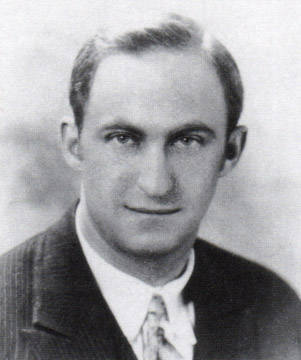(Created) Tag: Visual edit |
(Updated pages using birthname parameter instead of birth_name when using Infoboxes) |
||
| Line 1: | Line 1: | ||
{{Infobox politician|name=Jay Lovestone|image_size=200| | {{Infobox politician|name=Jay Lovestone|image_size=200|birth_name=Jacob Liebstein|birth_date=December 15, 1897|birth_place=Molchad, Grodno Governorate, [[Russian Empire]]|death_date=March 7, 1990|death_place=[[New York City]], [[State of New York|New York]], [[United States of America|United States]]|political_orientation=[[Nikolai Bukharin|Bukharinism]]<br>[[American exceptionalism]]|image=Jay Lovestone.png}} | ||
'''Jay Lovestone''' (December 15, 1897 – March 7, 1990) was a Statesian political activist and leader of the [[Communist Party of the United States of America|CPUSA]]'s [[Right-opportunism|right opposition]]. He became executive secretary of the party for two years after [[C. E. Ruthenberg]]'s death in 1927 and formed an alliance with [[Nikolai Bukharin|Bukharin]] in the [[Union of Soviet Socialist Republics (1922–1991)|Soviet Union]]. He developed the theory of American exceptionalism and claimed that the USA would not experience [[Economic crisis|economic crises]] like other [[Capitalism|capitalist]] countries. He also opposed [[self-determination]] for the [[Black Belt]]. The Central Executive Committee expelled Lovestone and his supporters from the CPUSA in 1929.<ref name=":1">{{Citation|author=[[William Z. Foster]]|year=1952|title=History of the Communist Party of the United States|title-url=http://williamzfoster.blogspot.com/|chapter=Building the Party of the New Type (1919-1929)|chapter-url=https://williamzfoster.blogspot.com/2013/01/chapter-nineteen-building-party-of-new.html}}</ref> | '''Jay Lovestone''' (December 15, 1897 – March 7, 1990) was a Statesian political activist and leader of the [[Communist Party of the United States of America|CPUSA]]'s [[Right-opportunism|right opposition]]. He became executive secretary of the party for two years after [[C. E. Ruthenberg]]'s death in 1927 and formed an alliance with [[Nikolai Bukharin|Bukharin]] in the [[Union of Soviet Socialist Republics (1922–1991)|Soviet Union]]. He developed the theory of American exceptionalism and claimed that the USA would not experience [[Economic crisis|economic crises]] like other [[Capitalism|capitalist]] countries. He also opposed [[self-determination]] for the [[Black Belt]]. The Central Executive Committee expelled Lovestone and his supporters from the CPUSA in 1929.<ref name=":1">{{Citation|author=[[William Z. Foster]]|year=1952|title=History of the Communist Party of the United States|title-url=http://williamzfoster.blogspot.com/|chapter=Building the Party of the New Type (1919-1929)|chapter-url=https://williamzfoster.blogspot.com/2013/01/chapter-nineteen-building-party-of-new.html}}</ref> | ||
Latest revision as of 23:28, 3 April 2024
Jay Lovestone | |
|---|---|
 | |
| Born | Jacob Liebstein December 15, 1897 Molchad, Grodno Governorate, Russian Empire |
| Died | March 7, 1990 New York City, New York, United States |
| Political orientation | Bukharinism American exceptionalism |
Jay Lovestone (December 15, 1897 – March 7, 1990) was a Statesian political activist and leader of the CPUSA's right opposition. He became executive secretary of the party for two years after C. E. Ruthenberg's death in 1927 and formed an alliance with Bukharin in the Soviet Union. He developed the theory of American exceptionalism and claimed that the USA would not experience economic crises like other capitalist countries. He also opposed self-determination for the Black Belt. The Central Executive Committee expelled Lovestone and his supporters from the CPUSA in 1929.[1]